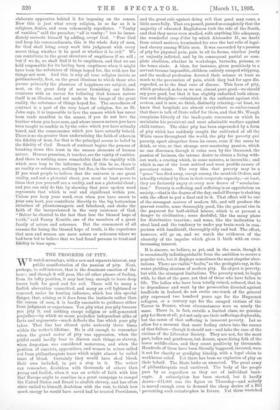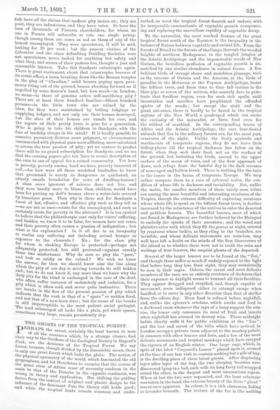THE PROGRESS OF PITY.
WE watch nowadays, with a new and separate interest, any public manifestation of the passion of pity. Next, perhaps, to self-interest, that is the dominant emotion of the hour; and though it will pass, like all other phases of feeling, from its lofty position, it may last long enough to leave deep traces both for good and for evil. There will be many a foolish aberration committed, and many an evil lightened or removed, under its heating influence, which has this special danger, that, arising as it does from the instincts rather than the reason of men, it is hardly amenable to guidance either from judgment or experience. You pity what you pity because you pity it, and nothing except religion or self-generated prejudice—by which we mean prejudice independent alike of facts and arguments—much deflects the line which your pity takes. That line has altered quite seriously three times within the writer's lifetime. He is old enough to remember when the grand motor of pity was oppression, when the pitiful could hardly bear to discuss such things as slavery, when despotism was considered monstrous, and when the position of convicts, apprentices, and women in mines called out from philanthropists tears which might almost be called tears of blood. Certainly they would have shed blood, their own included, to put a stop to it. The writer can remember, doubtless with thousands of others then young and foolish, when it was an article of faith with him that Europe ought to combine in a great campaign to compel the United States and Brazil to abolish slavery, and has often since smiled to himself, doubtless with the rest, to think how and the great rule against doing evil that good may come, a little more fully. That era passed, passed so completely that the majority of educated Englishmen took the side of the South, and that they never even studied, with anything like adequacy, the wonderful coup d'etot by which Alexander II., no doubt from mixed motives, terminated for ever the last relic of legal- ised slavery among White men. It was succeeded by a passion of pity for physical pain, pain in all its forms, whether justly or unjustly inflicted, and by its consequent partial or com- plete abolition, whether in workshops, barracks, prisons, or the home circle. A blow, for instance, given punitively to a servant became impossible, children entirely escaped whipping, and the medical profession devoted their science at least as much to the prevention of pain, which they had for ages die. regarded, as to the final cure of disease. This form of pity, which produced, so far as we see, almost pure good—we should say pure good, but that it has slightly enfeebled both educa- tion and discipline—culminated in the outburst against vivi- section, and is now, we think, distinctly relaxing,—at least, we know that hospitals are almost everywhere so embarrassed that there is talk of State relief for them, and that Mr. Waugh complains bitterly of the inadequate resources on which he maintains his persistent and most admirable warfare against child-torture. The elder pity has been superseded by a form of pity which has suddenly caught the cultivated of all the White races throughout the world, the pity for poverty quet poverty, apart altogether from its cause, even if the cause be drink, or vice, or that strange over-mastering passion, which no one discusses, though it ruins men by the thousand, the passion of laziness, the intense desire to obtain a living with- out work, a craving which, in some natures, is incurable ; and which is one of the least noticed and most prolific causes of pecuniary crime. The very idea that poverty may be a "grace" has died away, except among the monkish Orders, and is hardly retained by them in their corporate capacity,—at least, they are furiously angry at every new decree of "secularisa- tion." Poverty is suffering, and suffering is an opprobrium on society,---that is the dogma of the day, and all Europe is shaking with the effort to put a final end to it, That effort will be one of the strongest motors of modern life, and will produce the gravest results, some thoroughly good, like the general rise in the payment for half-skilled labour, which is at present a danger to civilisation ; some doubtful, like the many plans for distributive taxation ; and some, like the inclination to steal land and the tendency to under pay brain-work in com- parison with handicraft, thoroughly silly and bad. The effort, however, will go on, and we watch the evidences of the sincerity of the impulse which gives it birth with an ever- increasing interest.
It is sincere, we believe, as yet, and in the main, though it is occasionally indistinguishable from the ambition to secure a popular vote, but it displays sometimes the most singular aber- rations. There are visible" faults," as the geologists say, in the water-yielding stratum of modern pity. Its object is poverty, but with the strangest limitations. The poverty must, to begin with, be that of the poor, not that of those who have fallen in life. The ladies who have been totally ruined, reduced, that is, to dependence and want by the persecution directed against landlords in Ireland, do not excite one-tenth of the general pity expressed two hundred years ago for the Huguenot refugees, or a century ago for the escaped victims of the Terror in France, whose circumstances were so nearly the same. There is, in fact, outside a limited class, no genuine pity for them at all; yet not only are their sufferings deplorable, but the cause of that suffering is innocent poverty. Let us allow for a moment that caste feeling enters into the causes of that failure—though it should not—and take the case of the victims of the Liberator Society. They are not, for the most part, ladies and gentlemen, but decent, spare-living folk of the lower middle-class, and they count positively by thousands. Hundreds of them have been literally beggared, invested, were it not for charity or grudging kinship, with a legal claim to workhouse relief. Yet there has been no explosion of pity on their behalf. The State looks on unmoved. The great army of philanthropists read unstirred. The body of the people pass by as regardless as they are of individual bank- rupte. A subscription has been started, but it hardly draws-411,000 was the figure on Thursday—and nobody is moved enough even to demand the cheap device of a Bill
folk have all the claims that modern pity insists on ; they are poor, they are industrious, and they have votes. So have the tens of thousands of Panama shareholders, for whom no one in France will subscribe or vote one single penny, though among them are cases as sad as those of any of the 'honest unemployed. They were speculators, it will be said, looking for 20 per cent. ; but the poorest victims of the Liberator and the other defaulting Building Societies were not speculators, never looked for anything but safety and what they, and scores of their pastors too, thought a just and reasonable interest. Take this Sandgate catastrophe again. There is great excitement about that catastrophe, because of its scenic effect, a town breaking down like the Roman temples in the play of " Claudian," solid houses gaping open, pave- -merits rising out of the ground, beams shooting forward as if impelled by some demon's hand, but how much—in London, we mean—is there of genuine active self-sacrificing pity P There are at least three hundred families—fifteen hundred persons—in the little town who are ruined by the blow, for they were maintained by letting lodgings or 'Supplying lodgers, and not only are their houses destroyed, but the sites of their houses are unsafe for over, and the repute of their pretty town is gone for a generation. Who is going to take his children to Sandgate, with the fear of landslip always in his mind? It is hardly possible to 'conceive pecuniary distress more poignant, or circumstances unconnected with physical pain more afflicting, more calculated to arouse the true passion of pity; yet we venture to predict there will be no grand subscription for Sandgate, and we see that the evening papers give ten lines to scenic description of the ruin to one of appeal for a rained community. Yet here iS poverty, poverty among hard workers, poverty innocent of
• svil,—for how were all these wretched landladies to know that greensand is nearly as dangerous as quicksand, an 'utterly unsafe foundation for rows of dwelling-houses ? A class more ignorant of science does not live, and they were hardly more to blame than children would have been for putting up doll's houses above a water-hole covered by tenacious grass. Then why is there not for Sandgate a 'burst of hot, effusive, and effective pity such as they tell us --•we are not so sure—exists for the unemployed, and such as certainly exists for poverty in the abstract ? It is too cynical to believe that the philanthropic care only for voters' suffering, and besides, we know it to be false, for women have not votes, and their poverty often rouses a passion of indignation ; but What is the explanation ? Is it all due to an incapacity to realise any suffering not including actual hunger or 'exposure to the elements ? No ; for the class pity for whom is shaking Europe is protected—perhaps not -adequately protected, but still protected—against exactly those two misfortunes. Why do men so pity the "poor," and look so coldly on the ruined ? We wish we knew t he. answer, for then we should know also the line along which the pity of our day is moving towards its still hidden ; but we do not know it, any more than we know why the we..eP Pity for the blind is exchanged in the ease of the deaf, .no often suffer tortures of melancholy and isolation, for a -131tY which is often cold, and never quite instinctive. There are. breaks in the flow of the present passion of pity which mddicate that the rush is that of a " spate " or sudden flood, .a. n not that of a new-born river; but the cause of the breaks is still imperceptible to the most patient social geologist. 'The land submerged all looks like a plain, yet whole spaces, sometimes very large, remain persistently dry.



































 Previous page
Previous page